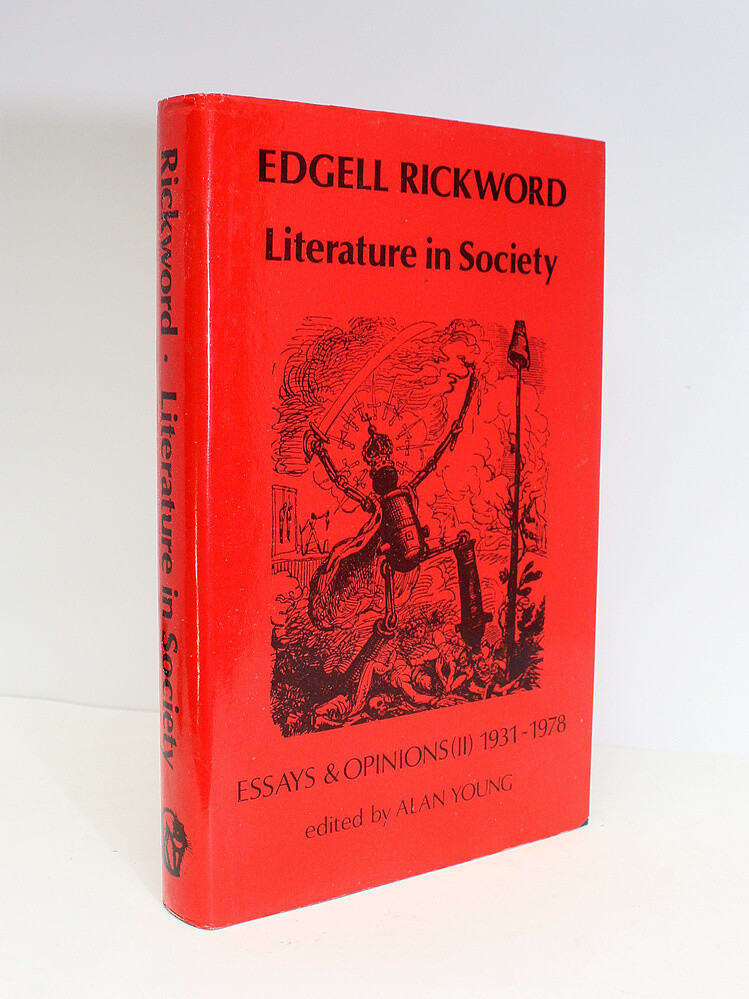
Literature in Society Essays and Opinions 1931-1978 (From the Authors and Daughters library) - Edgell Rickword SIGNED
1st Edition 1978. Presentation copy from the author to his daughter. From the library of John Edgell Rickword, his wife Beatrix and finally by decent to their daughter Dr Jane Grubb. Small bookplate detailing the provenance attached to each volume. Most of the his books went to institutions after his death so this book is rare thus. John Edgell Rickword, MC 1898-1982 was an English poet, critic, journalist and literary editor. He became one of the leading communist intellectuals active in the 1930s. After joining the army he saw front-line action in France as a subaltern in the Royal Berkshire Regiment. He was wounded twice losing the sight of one eye and he won the Military Cross for distinguished service. After the armistice Rickword was invalided out of the army. The following year he went to Pembroke College, Oxford, to read French literature. His first collection of verse, Behind the Eyes (1921), contains similar styles poetry to be found in Sassoon’s war verse. Additionally, these poems, including the much-anthologized “Trench Poets,” “Winter Warfare,” and “The Soldier addresses his Body,” were part of Rickword’s already distinctive style. In the 1930’s he took up literary work in London. He reviewed for the Times Literary Supplement, which led to his celebrated review of T. S. Eliot's The Waste Land. He joined the Communist Party of Great Britain in 1934, and became increasingly active in political work during the period of the Spanish Civil War; while still writing poetry. During the second world war years Rickword wrote some superb social and literary criticism, including studies of the war poets of World War I, John Milton, and English radical thinkers of the 19th century. Toward the end of the war he become editor of Our Time, a literary review that tried to create bridges between the arts and common people. Later he became Editor of Our Time, the Communist review, from 1944 to 1947, working with Arnold Rattenbury and David Holbrook. Rickword had an upbeat view at the time on the possibilities of popular culture and radical politics, and the circulation rose as he broadened the publication's scope from popular political poetry. Rickword’s eyesight failed completely in his last years, though he was working on his memoirs up to his death. He died on March 15, 1982. Rickword’s actual contribution to the development of English poetry is undervalued even now, in spite of the fact that several selections from and collections of his poems have appeared at regular intervals since the end of World War II.The reputation of Rickword as a poet has been overshadowed to some extent by his better-known achievements as critic and editor. And yet Rickword the poet—as much as Rickword the brilliant literary and social critic or Rickword the outstanding editor—has been one of the models of creative intelligence in British culture since the end of World War I. Rickword’s work stands foursquare in English tradition, but it is in that tradition revolutionized by the same shaping forces of modernism that transformed Eliot’s poetry. Rickword, with an intelligence and sensibility fully responsive to both French poetry and to English, opened up new paths for English poetry during the decade after World War I. According to Rickword, “to himself the poet should be in the first place a man, not an author.” He certainly followed his own advice. As David Holbrook wrote (about Rickword’s most caustic poetry of the late 1920s): “It strikes home, because underlying it is the tragic acceptance of man’s situation, and the governed urbanity, civilisation and joy of a sensitive, responsible poet.” The bulk of Edgells’s archive resides at Manchester University library but the main part of the collection which was deposited by his friend David Holbrook is at Downing College Cambridge Archive. Book is very good++ and bright. Contents good. The wrapper is very good++ and bright
